When Writing To Audiences Whose First Language Is Not English, Using Humor Is Generally
10 Common Words That You'll Only Find in English
From cheesy to cool, all other languages borrow these indispensable terms from us!
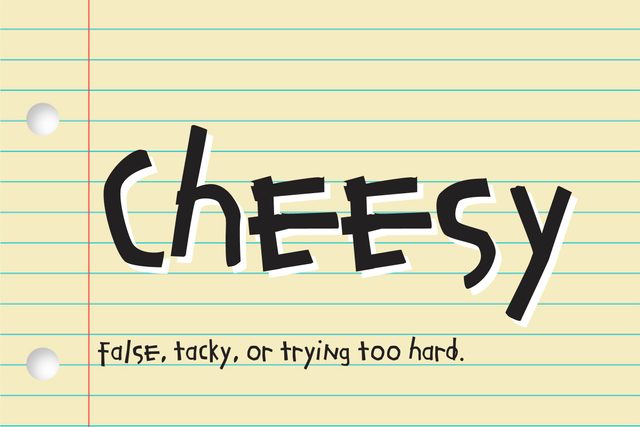 Tatiana Ayazo /Rd.com,Shutterstock
Tatiana Ayazo /Rd.com,Shutterstock
Cheesy
Other languages have words that mean false, tacky, or trying too hard, but only the English slang term "cheesy" can fully express something so fake that it stinks like Camembert: "He came up to me at the bar with this big cheesy grin on his face and said, 'Did it hurt when you fell from heaven?'" See if you can guess the most annoying word in English.
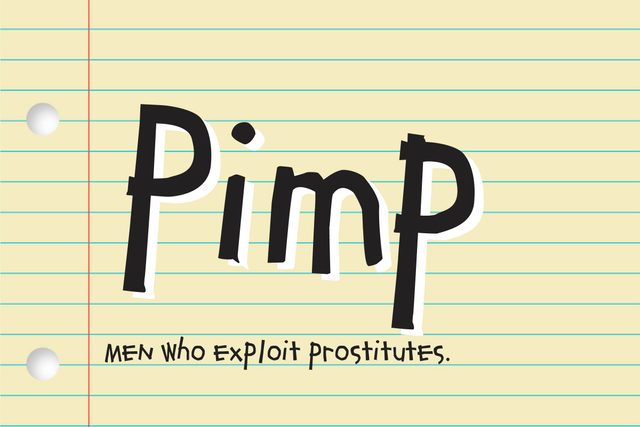 Tatiana Ayazo /Rd.com,Shutterstock
Tatiana Ayazo /Rd.com,Shutterstock
Pimp
Surely this word's transformation is one of the strangest in the English language (which is saying a lot). According to Merriam-Webster, men who exploit prostitutes have been called "pimps" since the 1700s, and since way before then, they've been dressing in showy outfits around the world. But only in English has "pimp" become a humorous, semi-favorable verb, meaning to refurbish something, to make it super-fancy, as in the reality TV show Pimp My Ride.You thinkthat'sweird? Check out these bizarre slang words from the 1920s.
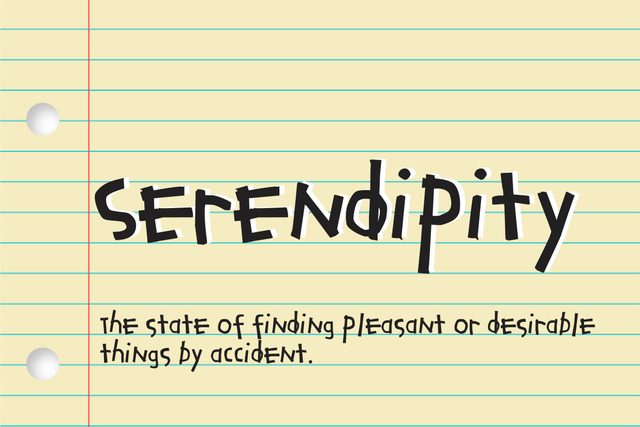 Tatiana Ayazo /Rd.com,Shutterstock
Tatiana Ayazo /Rd.com,Shutterstock
Serendipity
Many of the words on this list are slang, but not this one. According to Merriam-Webster, serendipity, which means the state of finding pleasant or desirable things by accident, comes from Serendip, an ancient name for Sri Lanka. In 18th century Britain, the writer Horace Walpole popularized the word in reference to a folk tale about 'the three princes of Serendip,' who "were always making discoveries, by accidents and sagacity, of things they were not in quest of." Sounds like serendipity to us! These beautiful words have no English equivalent.
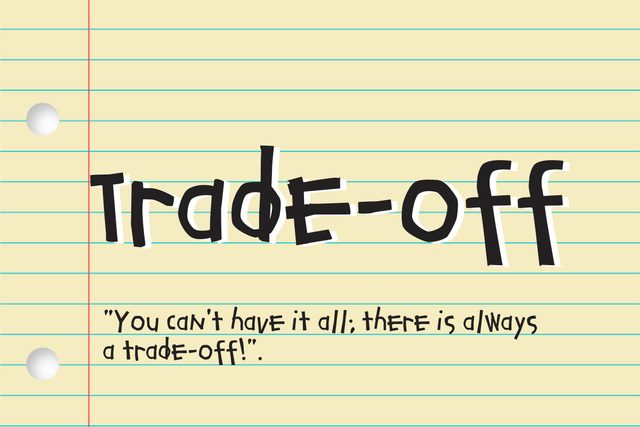 Tatiana Ayazo /Rd.com,Shutterstock
Tatiana Ayazo /Rd.com,Shutterstock
Trade-off
It's often been observed that English is the easiest language to learn but the hardest to learn well…and this neat, compact expression goes a long way in explaining why. "Trade" is one of the many English verbs that change dramatically when paired with different prepositions… and each expresses a concept that would take a whole sentence to explain in any other language: Trade in, trade up, and trade down are just a few examples. But the trade-off is a particularly American concept; what other nationality would actually have to state: "You can't have it all; there is always a trade-off!" Trying to learn a language other than English? Start from "hello."
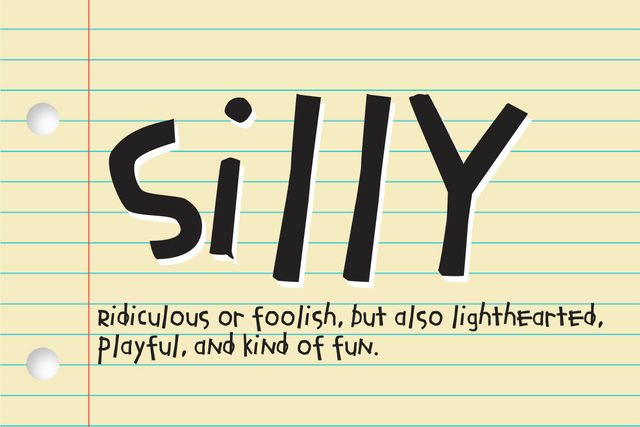 Tatiana Ayazo /Rd.com,Shutterstock
Tatiana Ayazo /Rd.com,Shutterstock
Silly
There are plenty of synonyms out there for ridiculous or foolish, but this one also means lighthearted, playful, and kind of fun. Could it be a faint echo of the word's evolving definition? According to the Oxford English Dictionary, 500 years ago silly meant "happy, blissful, lucky, or blessed. From there it came to mean innocent, or deserving of compassion," which morphed into the delicious absurdity we enjoy today in silly hats, silly jokes, and, perhaps best of all, Monty Python's Ministry of Silly Walks. Here are some common words that were inspired by real people.
 Tatiana Ayazo /Rd.com,Shutterstock
Tatiana Ayazo /Rd.com,Shutterstock
Gobbledygook
Gobbledygook sounds like Middle English but according to Dictionary.com, this delightful term for unintelligible jargon actually only dates from World War II, when American Congressman Maury Maverick (yes, really his name) "used [it] in a memo dated March 30, 1944, banning 'gobbledygook language' and mock-threatening, 'anyone using the words activation or implementation will be shot.' Apparently Maverick was thinking of a turkey's "gobble." These are the funniest words in the English language.
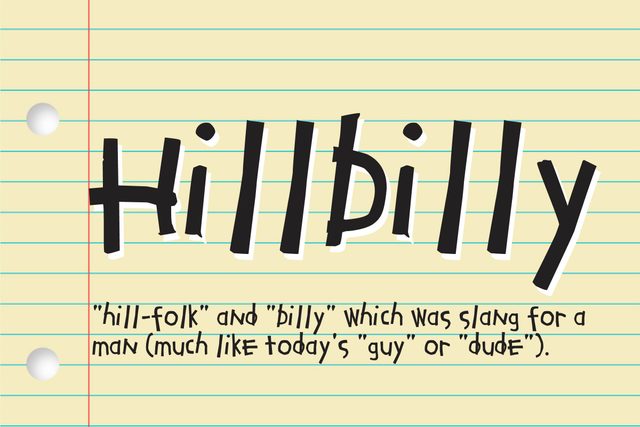 Tatiana Ayazo /Rd.com,Shutterstock
Tatiana Ayazo /Rd.com,Shutterstock
Hillbilly
According to Dave Tabler, at Appalachian History website, this name for a rural American was brought by Scots-Irish settlers who flooded Appalachia in the 1700s. The word probably comes from two Scottish words mashed together: "hill-folk" and "billy" which was slang for a man (much like today's "guy" or "dude") and the term was more descriptive than disparaging. But these days if you don't consider yourself a hillbilly, don't call someone else one… or you'll discover "them's fightin' words!" And watch out for these 12 words with surprisingly offensive origins, too.
 Tatiana Ayazo /Rd.com,Shutterstock
Tatiana Ayazo /Rd.com,Shutterstock
Facepalm
People have been hiding their faces in their hands to express embarrassment, dismay, or exasperation for hundreds of years (at least), but Merriam-Webster dates the term "facepalm" to 1996, making it the newest word on this list. Our favorite use of the word comes from The Los Angeles Review of Books in 2014: "There's a kind of facepalm moment in the terrific pilot episode of Amazon's terrific new series Transparent when you realize that the title is a pun."
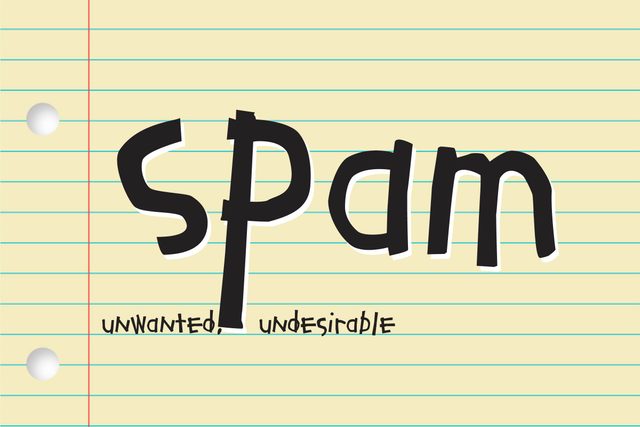 Tatiana Ayazo /Rd.com,Shutterstock
Tatiana Ayazo /Rd.com,Shutterstock
Spam
As Time magazine puts it, "Before 'spam' was a word that represented unwanted emails, it was a word that represented the successful repackaging of unwanted meats." Introduced in 1937, SPAM was a clever way to repackage the undesirable cut of pork shoulder, and the brandname itself is a combination of "spiced" and "ham," invented in a naming contest. The newer meaning derives from a skit by the 1970s British comedy troupe Monty Python in which a band of Vikings drown out all other conversation by shouting the word "spam" over and over again—much as a barrage of unsolicited commercial emails will overwhelm everything else in your inbox. Learn the names of some very specific things you didn't realize had names.
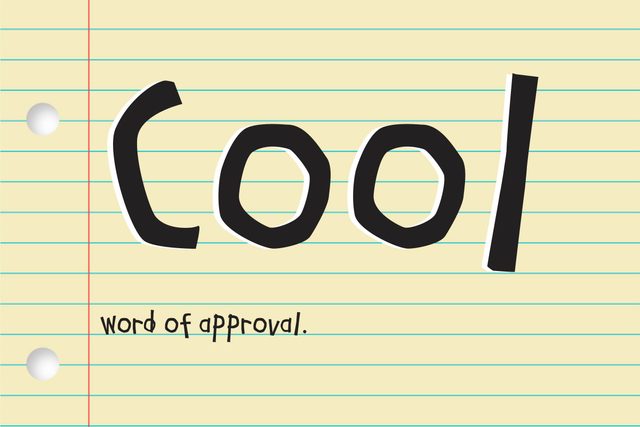 Tatiana Ayazo /Rd.com,Shutterstock
Tatiana Ayazo /Rd.com,Shutterstock
Cool
This multifaceted word of approval is another one that started out meaning one thing and wound up as another. According to Merriam-Webster, we have to go all the way back to 12th century Middle English to find the first mention of cool, meaning the opposite of hot. Over the years this idea gets applied to emotions: tempers that run hot or cool. In the 1920s, American jazz culture prized that quality of relaxed calm in music and in life, and the word became a synonym for admirable, fashionable, and good, across the globe. Now that's cool! Learn the origins of some of the most common English slang terms.
Originally Published: February 25, 2019
Sign up for articles sent right to your inbox
Enjoy the best stories, advice & jokes delivered right to your inbox!

Subscribe & SAVE Save Up To 84%!
When Writing To Audiences Whose First Language Is Not English, Using Humor Is Generally
Source: https://www.rd.com/list/english-words-no-other-language/
Posted by: cordersolloond.blogspot.com

0 Response to "When Writing To Audiences Whose First Language Is Not English, Using Humor Is Generally"
Post a Comment